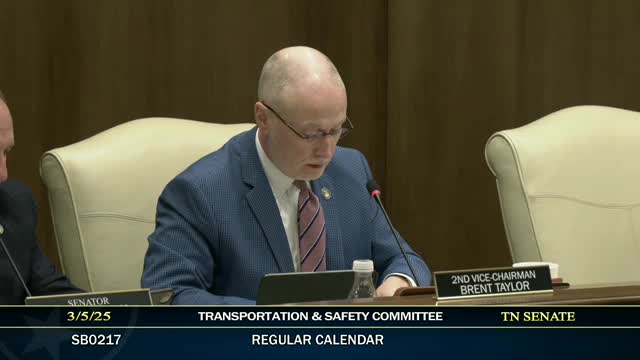Committee advances bill allowing TDOT MOUs to preplan homeless‑encampment responses; advocates warn of costs
Get AI-powered insights, summaries, and transcripts
Subscribe
Summary
Senate Bill 217 would authorize the Tennessee Department of Transportation to enter memoranda of understanding with local governments and service providers to preplan responses to roadside homeless encampments. The committee approved the bill after testimony from a homeless‑services provider who warned the measure could shift heavy costs and risk
The Transportation and Safety Committee on Oct. 12 approved Senate Bill 217, a measure that would permit the Tennessee Department of Transportation (TDOT) to enter memoranda of understanding (MOUs) with local governments and nonprofit service providers to preplan responses when homeless encampments appear on state rights‑of‑way.
Why it matters: Sponsors said preplanning will reduce delays and confusion when encampments are reported and help connect people living outdoors to services. A statewide homeless‑services advocate told the committee the bill’s timelines and removal authority risk shifting expensive cleanup costs to local governments and could harm people living in encampments if property is discarded before stable housing is found.
Sponsor explanation: Senator Taylor said the bill would require TDOT and local communities to agree in advance on responsibilities, including outreach, referral to shelter and handling personal property, so that cleanup operations can proceed quickly and in coordination with social‑service partners. The sponsor emphasized the bill does not criminalize homelessness and is intended to streamline a response that previously required ad‑hoc planning for each site.
Testimony and concerns: Lindsay Krinx, cofounder of OpenTable Nashville and Housing for All Tennessee, told the committee that the bill as amended permits TDOT to dispose of property after a 10‑day notice and set a 30‑day removal timeline. She warned that in many counties the shortage of shelter and affordable housing means those timelines are too short to secure placements — Nashville averages about 143 days to house a person after intake, she said — and that cleanup costs and fencing or vegetation removal could shift to local governments and underfunded nonprofits.
Committee response and vote: Sponsors and some members disagreed on whether the bill would help or harm people experiencing homelessness; sponsor Taylor and others said MOUs will facilitate referrals to services and reduce the “building the plane while flying” problem seen in prior cleanups. After adopting the amendment, the committee advanced SB 217 to the calendar (recorded as 7 ayes and 1 no).
Ending: The sponsor and a witness urged continued coordination with local service providers; members asked for continued communication on how MOUs will allocate costs and protect personal property during site clearances.
